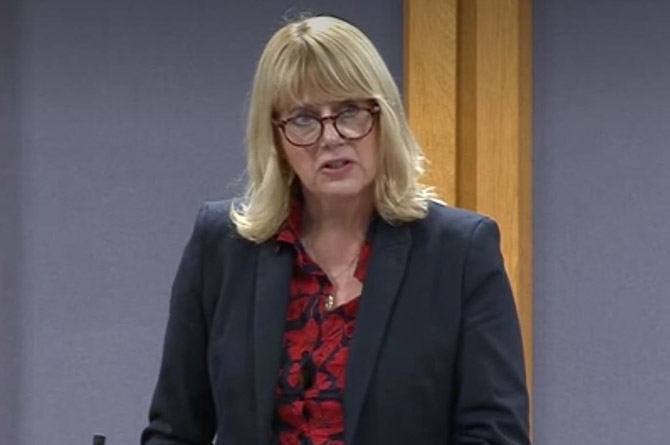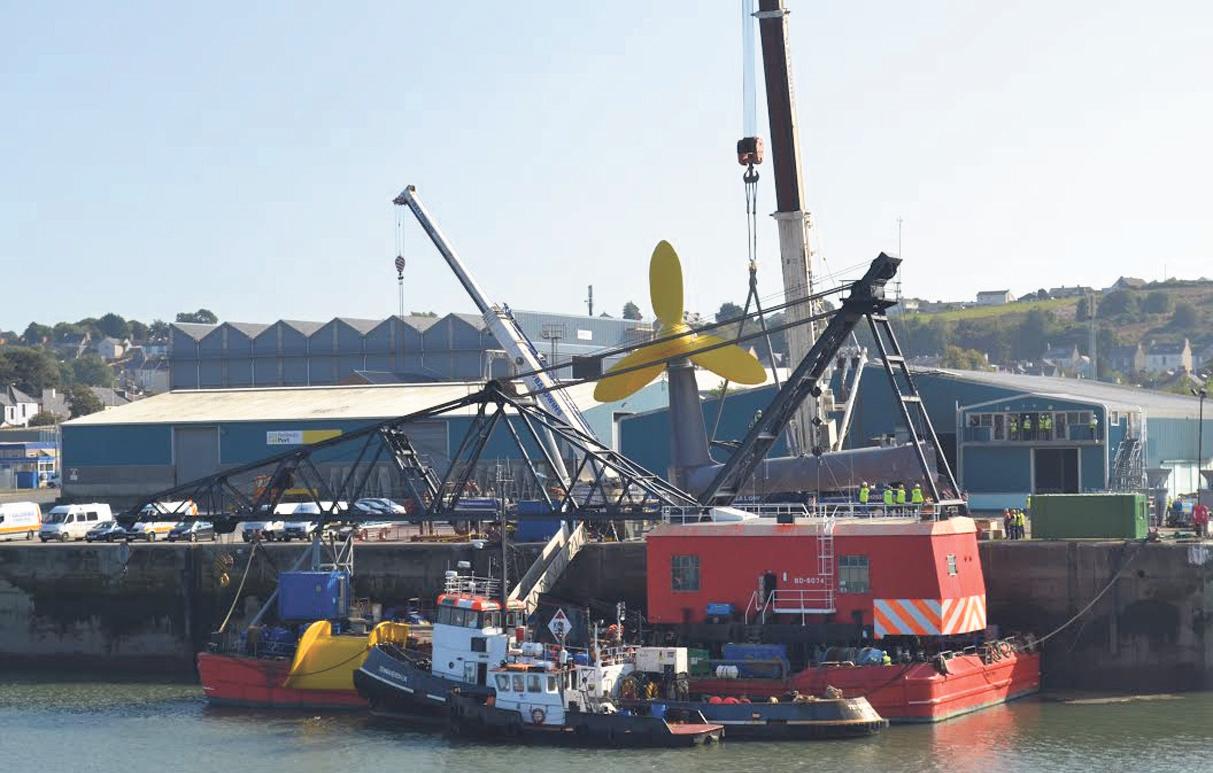Climate
Carolyn Thomas calls for national flooding plan

A SENEDD member recalled her family’s own experience of the devastating impact of flooding as she called for a national resilience plan.
Warning of more frequent monsoon-like rainfall, Carolyn Thomas told the chamber the first time her home was impacted she was woken in the early hours.
She said: “A neighbour wanted to alert me to the fact our pet rabbit had drowned, so we could remove him from the run before our children woke up.
“I was shocked to see a river of water pouring off the highway down our drive, swelling into the garage, and water falling down the steps in the garden, where the force knocked over a brick wall to rejoin the stream at the back of our garden.
“It was devastating for the children and for all of us. And this was because of a blocked culvert on private land further up the road, and it could have been prevented.”
Ms Thomas said it happened again during October’s storms as the culvert was not cleared.
She told MSs: “A neighbour has been out of her property for approximately five months now, staying in a hotel over Christmas, nowhere to cook, nowhere to wash up. Her daughter’s a nurse who’s also been struggling, and she’s desperate to have her home back.”
The Labour backbencher, who was elected to represent North Wales in 2021, warned that too often there is confusion and denial of responsibility.
Ms Thomas called for Natural Resources Wales to maintain a register of who owns drainage, ditches, culverts and small water courses, starting with those most impacted by flooding.
She said: “When flooding happens, it happens so quick, it’s often too late to act. The reaction is to call the council for sandbags, the fire service or police.
“Sandbags may help, but it’s often too late, and councils do not have to provide them. Many do not any more – they can’t afford to.”
Ms Thomas welcomed this week’s announcement of £34m for flood alleviation schemes.
The former deputy leader of Flintshire County Council stressed the importance of maintaining momentum as she warned that the rail network is extremely vulnerable.
She said: “If everybody knew their responsibility – whether it’s landowners or homeowners – under a national flood resilience plan, it could help prevent the devastation of flooding for communities right across Wales.”
Plaid Cymru’s Heledd Fychan called for a national flood forum for Wales, saying it is important to empower and support communities.
She said: “That national conversation is needed, but also that structure to support communities, because not everybody can actually advocate for themselves.”
Llyr Gruffydd, who represents North Wales, raised the concerns of farmers in the Conwy valley who have been working to repair the Tan Lan embankment.
“Farmers pay into the pot, but they don’t feel that they get a sufficient return,” he said.
His Plaid Cymru colleague Mabon ap Gwynfor similarly warned that farmers face an additional tax for a system that is failing them at the moment.
Mike Hedges, a Labour backbencher, who represents Swansea East, stressed that the water has to go somewhere as he raised the role of an artificial lake alongside the River Tawe.
He highlighted other actions to reduce flooding such as planting trees and shrubs, putting bends in rivers and making sure that culverts are clear.
Replying to the debate on March 20, Julie James pointed to the Welsh Government’s national strategy on flooding which draws on learning from devastating storms in 2020.
Ms James, who was climate change minister when the meeting was held, said she was interested in Heledd Fychan’s idea of a national forum for communities affected by flooding.
Précising a 400-page speech she was handed by officials, she said: “I think you need to make sure it dovetails together and isn’t just a forum to say how unhappy you are.”
Ms James, in what was her final contribution as climate minister before the reshuffle, said ministers will shortly respond to an independent review on flooding.
She added that the next climate change resilience strategy will be published in October.
Climate
Pembrokeshire announced as new location for Atlantic rainforest restoration

THE WILDLIFE Trust of South and West Wales (WTSWW) will begin restoring lost Atlantic rainforest in Pembrokeshire thanks to a long-term partnership with Aviva.
Today, Monday 15th July, WTSWW reveals plans to improve habitats and recreate temperate rainforest at Trellwyn Fach near the Pembrokeshire coast. Rainforests used to cover much of the west coast of Britain though were destroyed over hundreds of years and today, only fragments remain.
Rainforest restoration forms part of a wider programme of nature-based projects to remove carbon from the atmosphere and help nature recover, funded by Aviva’s donation. Communities in Pembrokeshire will be closely involved in the project, with plans for volunteering, educational and employment opportunities, as well as improved access to nature.
The project at Trellwyn Fach is part The Wildlife Trusts’ Atlantic rainforest recovery programme, which is supported by a £38 million donation from Aviva.
The Aviva donation supports the programme to restore temperate rainforests in areas where they used to grow along the damper, western climes of the British Isles. Other rainforest restoration projects have been announced in Devon, North Wales and the Isle of Man.
Sarah Kessell, Chief Executive at WTSWW said told The Pembrokeshire Herald: “We’re delighted this rainforest restoration project at Trellwyn Fach can get started. This site is ideally situated in the Gwaun valley, already connected to Celtic rainforest remnants and giving us the opportunity to buffer and extend this amazing habitat as well as improving access for the local community. These are exciting times!”
Leah Ramoutar, Director of Environmental Sustainability, Aviva, added: “We’re proud to see the Wildlife Trust add another site to the rainforest restoration project, helping Wales become more climate ready. The site in Trellwyn Fach will connect with existing examples of this precious habitat, reestablishing natural corridors to benefit wildlife and add more natural beauty to this stunning part of Wales. It will also provide flood resilience to nearby homes and businesses as well as green jobs and volunteering opportunities to the local community.”
Trellwyn Fach is 146 acres, next to the village of Llanychaer, and just 2 miles from Fishguard. The southern tip of the site connects with the Gwaun Valley woodland, itself a remnant Celtic rainforest. The north end runs onto open moorland on Dinas mountain. From the top of the site there are views of the Preseli Mountains. There is little diversity on the majority of the land with nearly all fields being of semi-improved rye grassland that were grazed by sheep, but there are some wetter areas and some lovely, mature hedgerows of blackthorn, hawthorn, hazel, oak, gorse and holly. Overall, the potential to improve habitats for wildlife is high.
WTSWW’s plans to improve the wildlife value of the new nature reserve through low-intensity grazing of some areas, working with local graziers. The Trust’s conservation team will monitor changes in biodiversity through habitat and species surveys including breeding bird surveys and butterfly transects.
Around two-thirds of the site will become broadleaved woodland through planting and natural regeneration, to buffer the existing woodland and to support the wider connectivity of remnant Celtic rainforest in the landscape. This woodland corridor leads in an arc through the Gwaun Valley, to Pengelli Forest (a WTSWW nature reserve) and the latest plans will contribute greatly to increasing the area of temperate rainforest in north Pembrokeshire. This complements recent work undertaken by Cwm Arian’s ‘Growing Better Connections’ project which engaged with private landowners in the same area to plant up land and/or hedgerows to link woodland habitats in north Pembrokeshire.
A bridleway runs across the bottom part of the site and there is scope to connect walking trails up to Dinas mountain to improve pedestrian access from Llanychaer. There are excellent opportunities to involve local communities in the development and monitoring of this new nature reserve.
Climate
Solar power partnership lighting up community energy fortnight

THE PARTNERSHIP between Pembrokeshire County Council and a community energy charity has recently helped two sites reduce costs and carbon emissions with solar panels.
During community energy fortnight, running until July 14th, the Green Pembrokeshire team is highlighting the second phase of work with Egni Co-op, a community energy organisation that installs rooftop Solar PV systems.
Egni cover the cost of installation and then sell the generated electricity to the building owner at a discount, with all profits generated used to fund further projects and environmental educational programmes.
In early 2023 Egni was awarded the contract to install systems on around 20 schools and leisure centres across the County and will manage and maintain the systems for 20 years.
It’s estimated that the solar panels will prevent the emission of approximately 200 tonnes of carbon dioxide per year and should save the schools and leisure centres £180,000 per year in energy costs.
This second phase has seen Fishguard Leisure Centre add a 170kW system to its existing 50kW provision and the energy will be sold to the building at a reduced rate. With the combined systems generating around 187,000 kWh a year, nearly 40 tonnes of CO2 will be offset.
During the first part of the month more than half the Centre’s electrical energy has been provided by the solar panels and daytime dependence on the grid is almost zero during the summer.
Also boosting its solar panel system is Tavernspite School where a 27kW system has been installed with discounted electricity reducing dependence on the electrical grid and offsetting approximately five tonnes of carbon emissions per year.
The school is one of many also benefiting from Egni’s education programme, alongside Sustainable Schools Pembrokeshire.
Egni Workshops challenge pupils to make the connection between energy and climate change, and school to reduce their energy through campaigning for behaviour change.
Cabinet Member for Place, the Region and Climate Change Cllr Paul Miller said: “These two sites are the latest to benefit from this innovative scheme that is helping the Council and its buildings make carbon savings, as well as saving money, without capital costs.”
Jenny Carlisle, Egni Development Manager, said: “We are delighted to be working with the Council and young people in Pembrokeshire schools. It’s a great example of co-operation. We all need to work together to tackle climate change and keep money in the Welsh economy.”
Climate
Marine Energy Boosts Welsh economy by £30m, Pembrokeshire leads

IN the 2023/24 financial year, Wales’ marine renewable energy sector delivered a substantial £29.9 million to the Welsh economy, as revealed in the latest State of the Sector Report by Marine Energy Wales. This brings the total cumulative spending and investment in the sector to an impressive £292.9 million.
Despite a notable reduction from the previous year’s £103.4 million, this year’s figure remains the second highest annual spend recorded to date. The decline is attributed to the conclusion of European grant funding and the completion of significant infrastructure projects, such as the Morlais development on Anglesey, which inflated last year’s expenditures.
Jeremy Miles, Cabinet Secretary for Economy, Energy and Welsh Language, expressed optimism about the sector’s future: “Wales is well placed to be at the forefront of marine energy technologies. Maximising this opportunity is an important step towards our path to net zero, attracting investment and creating highly skilled and well-paid jobs, particularly in coastal communities.”

The report highlights the considerable contribution of the tidal stream sector, which has injected £116.1 million into the Welsh economy since 2019, largely due to the Morlais infrastructure and the efforts of tidal kite developer Minesto.
Anglesey and Pembrokeshire are at the forefront of this growth, with Anglesey leading with £103.8 million in investments to date, closely followed by Pembrokeshire at £97 million. Swansea is also emerging as a key player, with £39.2 million invested in marine energy development.
The sector currently sustains 429 full-time jobs across Wales, with Pembrokeshire employing the highest number of people in the sector at 260 FTEs. This is due to the county’s established supply chain, which includes fabricators, engineers, and environmental consultants. Both Swansea and Anglesey also contribute significantly to employment in this sector.
Tam Bardell, Chair of Marine Energy Wales, underscored the importance of maintaining momentum: “We have just over a decade to meet the Welsh Government’s target of 100% renewable energy by 2035. While generating around 59% from renewable sources, we still have a long way to go. This report is not just a reflection of our achievements but a call to action.”
The future of the sector looks promising, particularly for tidal stream and floating offshore wind (FLOW), with a projected £486 million spend over the next five years in Wales. Continued support from governmental policies and increased private sector investment are essential for overcoming current barriers and ensuring Wales’ progression as a global leader in marine renewable energy generation.
As the sector grows, improving gender balance and diversifying roles remain positive steps forward, ensuring the industry’s sustainable development and its pivotal role in Wales’ economic and environmental future.
-

 Education5 days ago
Education5 days agoMilford Tesco worker achieves Oxford dream and lands top legal job
-

 Crime4 days ago
Crime4 days agoHaverfordwest man admits having nearly 1000 child and animal images
-

 Crime4 days ago
Crime4 days agoYouth set to appear in court over serious sexual offences
-

 Crime4 days ago
Crime4 days agoPolice investigating after man injured during altercation in cemetery
-

 Education4 days ago
Education4 days agoPupils delight in ice cream treat from Pembrokeshire’s number one van
-

 Crime4 days ago
Crime4 days agoTown centre ‘stinking of skunk’ as police strip cannabis farm
-

 Crime3 days ago
Crime3 days agoFag-butt police court summonses spark debate in Pembrokeshire
-

 News6 days ago
News6 days agoProposal to give firefighters a council tax discount to go to Cabinet





























